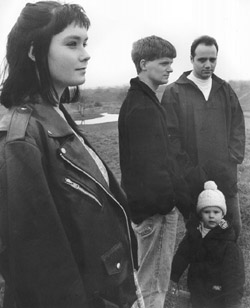


Dreamy and poppy. But not 'dream-pop'... thank goodness.
After a short, wordless accapella introduction from Anne Mari Davies, the first two songs on this album quietly and subtly redefine what you think these musicians sound like. Instead of taking their influences from their contemporaries, there seems to be a lot of stylistic influences. Mostly, the ambient soundscapes, reminiscent of less abrasive "Humblebee", scattered throughout the album are indicative of Brian Eno's post-modern musical ideals; while elsewhere, dub reggae inflections and classic acoustic singer songwriter confessionals bump heads and point the way towards the Trembling Blue Stars. Practically everything here looks either farther back or on a broader scope for its influences, consequently making for something entirely unique. The 2005 deluxe edition on LTM appends the Love Song For the Dead Che EP, which is two different recordings of the old United States of America hit from the 60's and "The Way That Stars Die" which is a straight up and down techno/house track. It feels genuine, but sticks out as a flub because everything else on the disc is so dissimilar. In any case, the proper album is worth it because the roads that Slowdive, DJ Shadow and Portishead —and maybe Björk, but she was on to something else entirely— would soon construct seemed to be taking their cues from some of the blueprints laid down on here.
~Austin

A more concise snapshot of a confused band.
Essentially a singles and coinciding b-sides collection, this collects the remaining material that these folks recorded under the Northern Picture Library moniker. As a whole, the singles the band released were much more tame than what they attempted on Alaska. There was no room for ambient interludes and found-sound collages. There is also a lot more preparation for the split of Bob and Anne Mari. If the first four tracks aren't a good clue-in that all is not well between them, I don't know is. Bob has gone from sounding like the sincerest, nicest, most vulnerable guy you'd ever meet to becoming a cynical, belligerent and bitter pessimist. "Last September's Farewell Kiss", an obvious sequel to the Field Mice's "September's Not So Far Away", sounds about as sincere as an apology after a hockey fight. "Last September's farewell kiss, when I think of it now, touches me so..." and you can just see him rolling his eyes and then, "You really care about me, don't you?" he inquires with a final sneer. The very next song is "Signs" and it's easily the most similar thing to the Trembling Blue Stars; all regret and hindsight. There are plenty of dreamy, ambient Anne Mari vocal tracks that are all great and more along the lines of Alaska. However, it's "Dear Faraway Friend", the band's longest, most epic, least accessible song that appears here in its entirety (eleven minutes!) that is, by far, the most interesting, and best, thing they did. I'm unsure what exactly it's about, but it finds Bob taking on the role of a character (maybe???) who is writing letters to his (her?) friend. The writer feels like they have to worry about death, only to respond that it was an overreaction and there's nothing to worry about. Eventually, a clue is given as the writer says that "this madness won't take over and that I'll survive it." "Thank you for worrying about me" Bob says a few times and then the song finally explodes from its hypnotic repetition into an increasingly noisy buildup; to my ears and mind, signaling that the madness did in fact takeover. Bob sings the song without any charisma whatsoever, making its meaning and/or story all the more unintelligible. A wonderful mystery of a song. The rest of Postscript gathers up the band's remaining catalogue and, despite the total lack of cohesion and all-overness of the material, it holds up surprisingly well as an album in its own right. I'd recommend getting this before Alaska because it presents everything that's good about the band, whereas Alaska indulges itself in very specific aspects.
~Austin